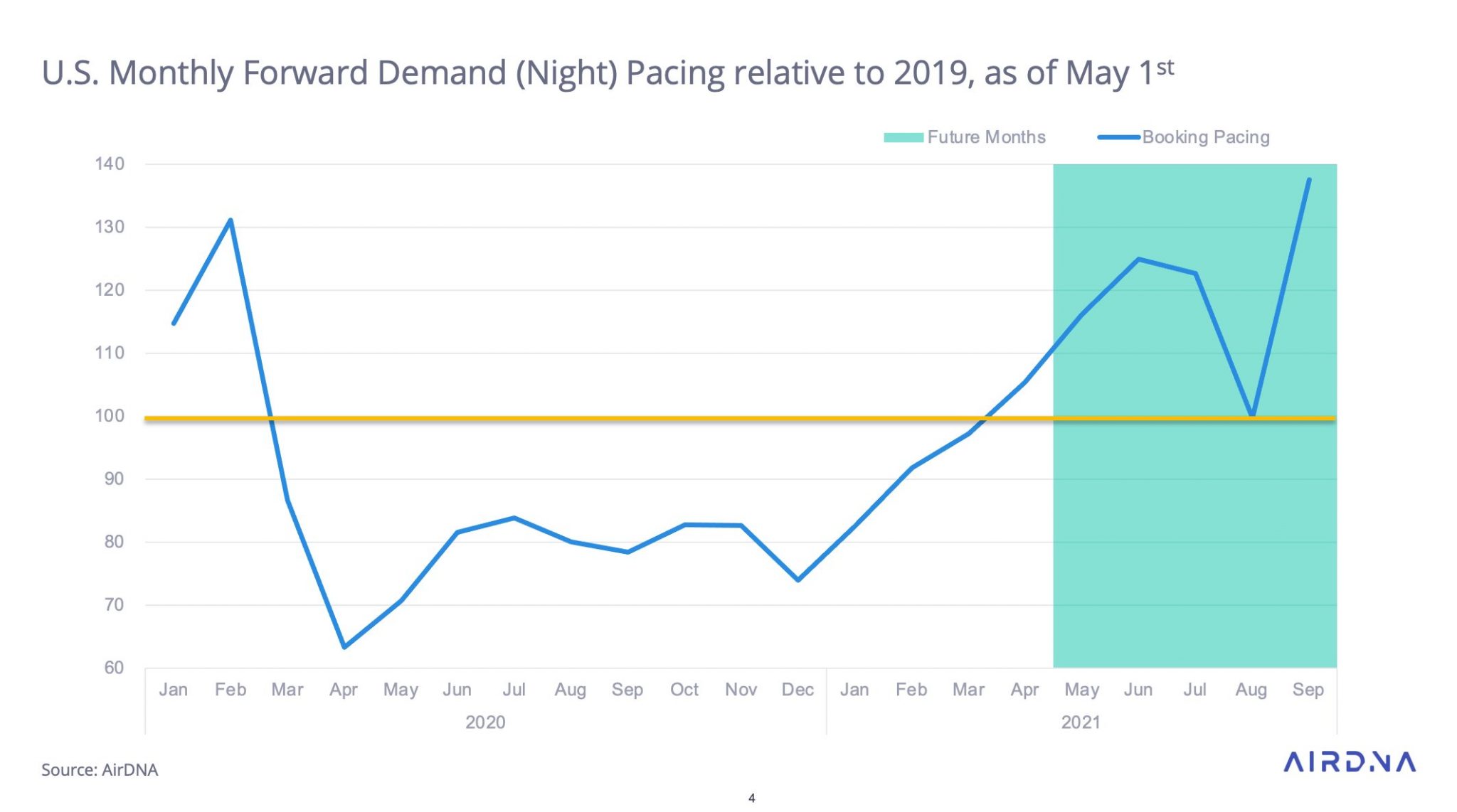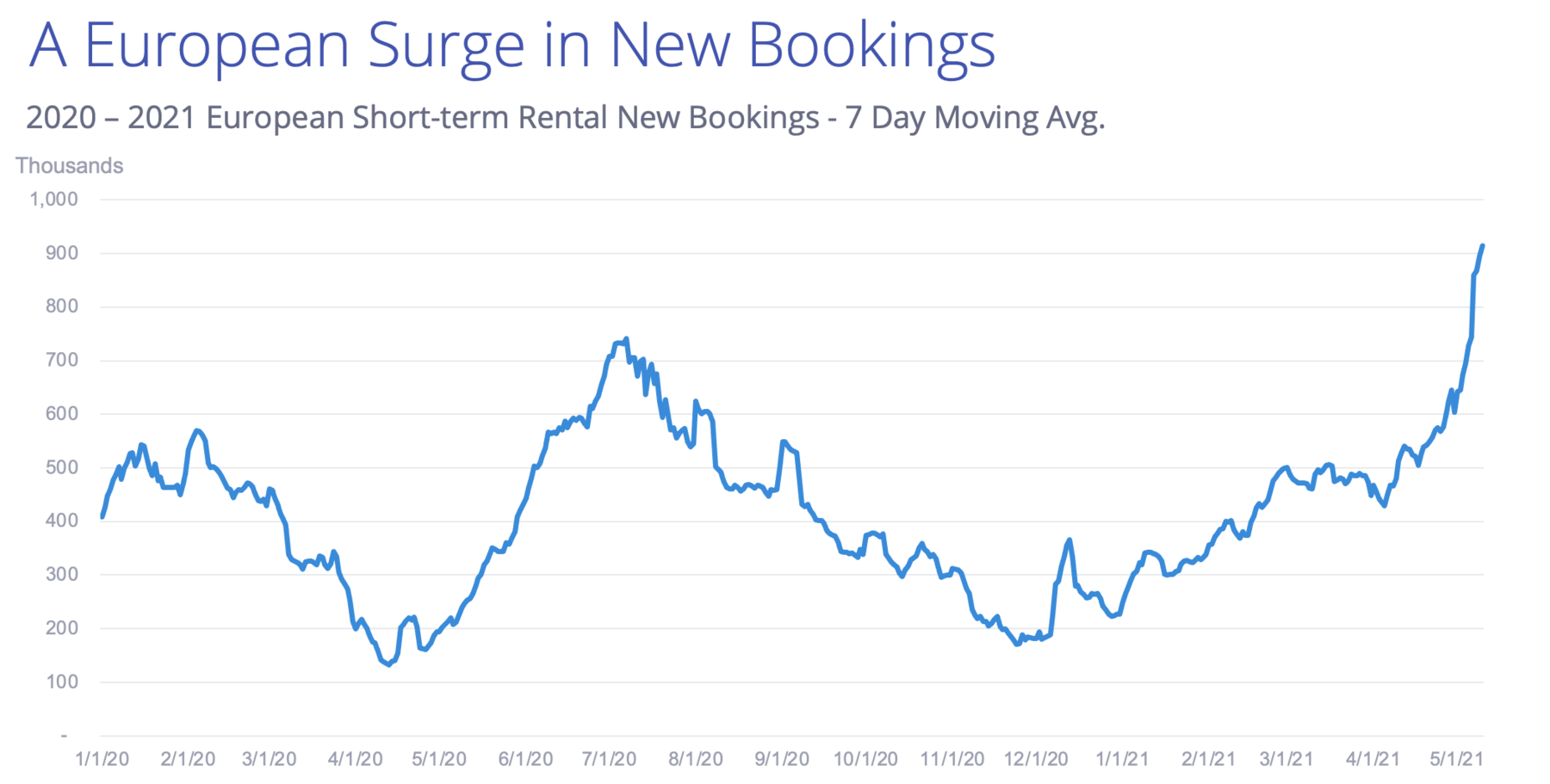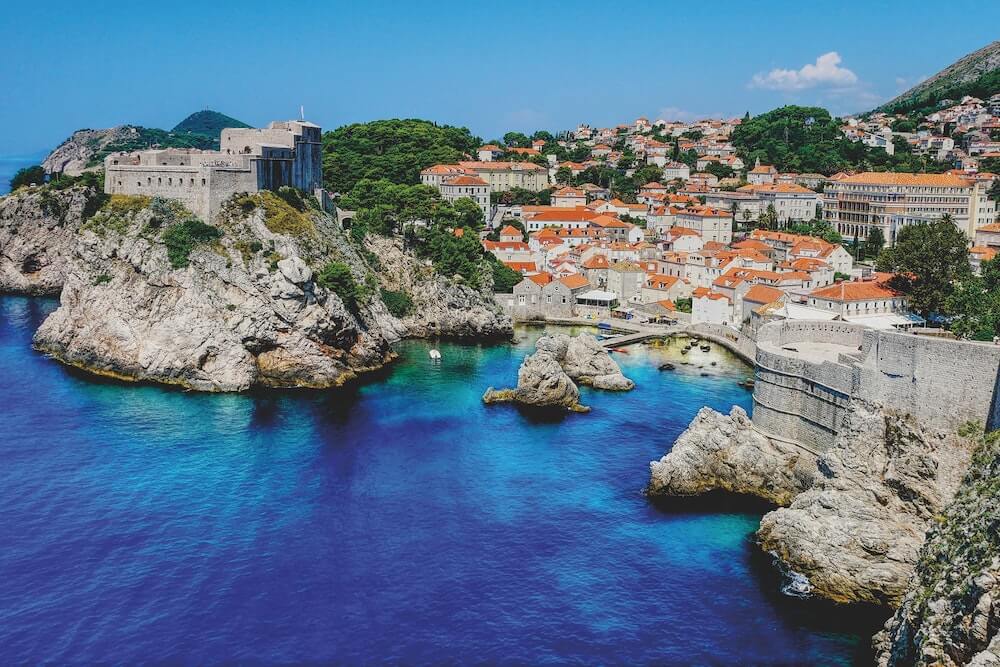The Summer season is heating up and vacation rentals are having an unexpectedly high upswing in bookings. The short-term rental market started to pick up early into the season this year in the United States, paving the way for holiday homes across the pond.
European vacation rental owners can breathe a sigh of relief now that the market is recovering and by considerable margins. Following their U.S. vacation rental counterparts, Europe has seen an incredible turn in summer bookings. The travel industry has been restlessly waiting to see what a “peak season” meant within the constraints of Covid-19, but numbers are growing, particularly in Europe and the United States.
The trend in European and U.S. travel is amplifying, but so is the need to cater to guests. Holidays are returning, but with an asterisk attached.
Booking pacing predicts the best summer in years in the U.S.
Numbers are ramping up in the U.S., showing particularly positive growth when looking at the booking pace. The rate at which reservations are being made has changed from a slow crawl to a booming speed. According to the data, last month demand increased by 66.4% over 2020 levels and 5.4% over 2019 levels, marking the first month since March 2020 where demand exceeded 2019 performance.

These numbers show that the market has not only recovered to the 2019 pace, but in some moments, it actually exceeded the previous rates. If these figures continue to stay on-trend, which is more likely than not thanks to vaccine availability and loosening restrictions, we can anticipate a summer of travel that will be better than it’s been at even the peak of previous years.
Almost back to pre-Covid numbers in Europe
The vacation rental industry was booming in 2019 before Covid struck. Many have been longing for the return of these numbers as properties sat vacant during confinement periods. Now, over one year since the start of the pandemic, numbers have recovered to a 98% booking pace. This rate is just 2% shy of the numbers that 2019 was producing and the season has only just begun.

When restrictions were still looking bleak in Europe, the reservation rate was somewhere between idle and lagging. As restrictions have started to loosen and the vaccine has become more available, the trends for bookings have positively aligned with these new changes.
What European countries are seeing the biggest growth?
Europe, at large, has seen an upward shift in bookings, but a couple of countries have seen an even more drastic change in numbers. The news is good for all European vacation rental owners, but the trends are incredible for a lucky few.
France is the frontrunner
Southern Europe has always been a hot spot for the summer holidays, but some countries are finding this to be more true than others. At the height of the pandemic, Spain, Italy, and France maintained a tight lock on borders and ordered strict rules. The unbinding of these rules has varied between countries. As far as this region is concerned, France seems to have escaped the anticipated doom of low booking rates.

Chalets are filling and short-term rentals dotting the French Riviera have exceeded the forecasted numbers for the upcoming season. A combination of positive factors, such as an increasing booking pace and decreasing cancellation rate, contribute to France’s vacation rental successes.
The UK
English manors and trendy south of London flats are picking up the pace once more. With such a variety of destinations, the UK is the second country to come out ahead of the post-pandemic predictions.
From May to June, the average daily rate rose from 130 pounds to 172 pounds. The peak season typically carries an inflated rate, but the fact that the upcoming summer months are back on par with previous high seasons tells us that things are looking up for UK vacation rental properties. In terms of increased bookings in general, the UK leads right behind France.
Croatia
As travelers increasingly desire more off-the-grid experiences, countries like Croatia get to reap the benefits. Croatia is the third most booked country amongst this travel revival. Being that 89% of their overall short-term rental market consists of entire homes, it’s no surprise that they’re succeeding.

We’ve continuously heard that the pandemic is causing a demand for authentic experiences and meaningful travel. A full home to prepare meals with the family, a backyard patio to unwind, or a fully-stocked office to work remotely meet the new needs of travelers and many of the short-term rentals in Croatia have grasped this understanding.
Portugal
This Mediterranean escape has always benefited from a moderate climate, a stellar location, and rich culture. Travelers from all over the world come to Portugal to relish in a great time, but this country took a significant hit at the height of the pandemic.
Portuguese leaders took a hard stance of restrictions, locking out any potential travelers. Still, wanderlust has been building and now that borders are reopening, many backlogged vacations can finally come to fruition.
Portugal is seeing one of the major rises in bookings in Europe as people pour back into the country. Investing in beachfront property has never been a bad idea, but now more than ever, countries like Portugal exemplify just how good these profits can be.
Greece
This country has been a beloved destination for many, especially U.S. tourists. The travel ban preventing U.S. visitors from entering significantly impacted Europe, and Greece was no exception to that. Thanks to the new PCR rules, U.S. travelers can take the Covid test on-site and spend their vacation quarantine-free.
As a result of these new restrictions, travel has surged for Greece. Greek vacation rental owners can turn their attention towards international guests as borders begin to reopen.
Extended stays are trending in Europe
Maybe one of these least surprising changes is a trend in more extended stays. The travel trends in the United States foreshadowed what would happen in Europe. Expedia’s report noted that 39% of U.S. travelers said their vacations would be at least a week long. Now we see this same trend cross over into Europe.

Many people have saved up their vacation days after not traveling last year, meaning they have more time to spend on holidays. Even those who don’t have time off are opting to work remotely during their holidays and are therefore booking more days, even weeks in some cases, at their holiday stay.
Travelers saved up both time and money. Many guests are eager to take that luxury vacation they’ve been dreaming of and Europe is just the place.
Tips for making the most of these new trends
The travel industry has long been gearing up for a return to normalcy. We’ve provided endless content on how to make the most of your vacation rental business during this time. We’ve listed three tips below on how to maximize profits during the summer boom, but check out some of our other useful posts on how to successfully navigate the vacation rental business during pandemic times.
1. Prepare your rental home for extended stays
Weekend getaways aren’t the top-choice anymore. We know that there’s been a growing movement in the travel industry towards more extended stays. Sites like Airbnb have changed their maximum stay length and some of their policies to better accommodate this shift. With searches for long-term visits growing by 50% compared to last year, it’s no wonder online travel agencies have been more than keen to adapt.
Your vacation rental business should account for these changes too. You can prepare your home for long-term guests by offering different amenities like subscription TV services, toiletries, or handy kitchen appliances. By marketing your home for long-term stays, you can benefit from a steady income, less turnover, and easier manageability.
2. Market your vacation rental for remote workers
One of the biggest travel trends for 2021 was the demand for remote working locations. As a result of the pandemic, many people have been granted the freedom to work from anywhere. To escape the monotony of their home offices, many travelers are uprooting and choosing to work from new locations.

This movement has its own set of needs and marketable desires. If you want to attract remote workers, you need to offer a space that accommodates them. Strong internet, multiple workstations, free stationery supplies, and ergonomic seating are just a few suggestions to lure remote working guests. The era of digital nomads is coming to Europe and your vacation rental should be ready for this.
3. Get your vacation rental website ready for the boom
The number of European bookings continues to grow, but the need for a competitive vacation rental website remains. To make the most out of this trend, get your website ready to fit the needs of your Euro-focused guests.
In times where international travel is picking back up, it’s always good to offer your website in multiple languages. Don’t miss out on these potential bookings by not having a multilingual site.
Having good vacation rental software is now crucial. The rise in reservations means risk in double bookings, which can easily be eliminated with a vacation rental software that offers a channel manager.
Create a compelling website that showcases all that your European destination has to offer. Travelers are looking to book that idyllic summer vacation and your website should appeal to that wish if you want to increase your bookings.
What to take away
There’s nothing but good news to share for the European travel scene. Cancellation rates have improved, the booking pace and the overall amount of bookings have indicated promising results for the season to come.
The high season is fast approaching, but there’s still some time to take advantage of this surge. Implement a cleaning checklist to provide your guests added comfort, kickstart a marketing campaign, or fix up your website to wow your potential guests.
European travel is upon us, so how will you make the most of this rising trend?


